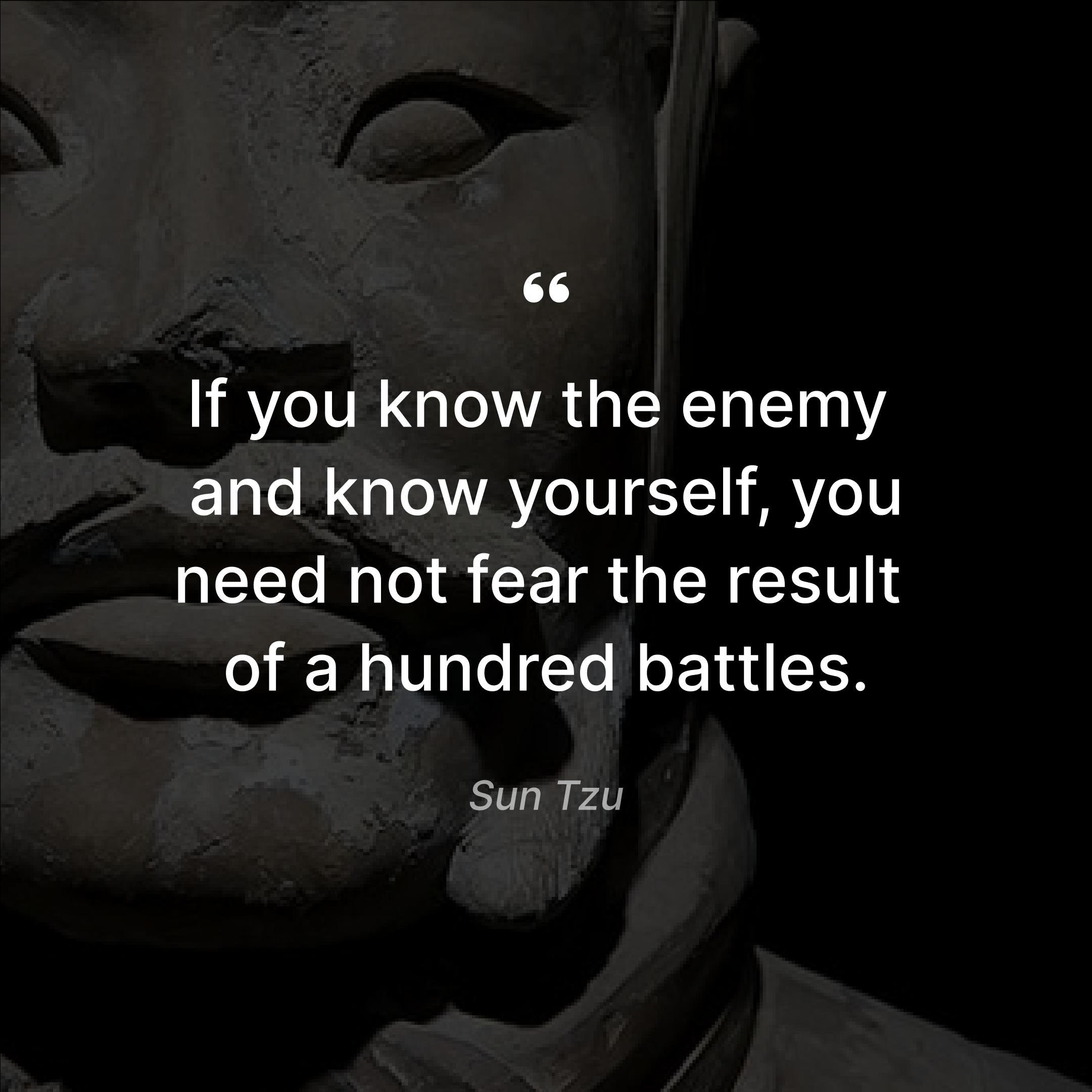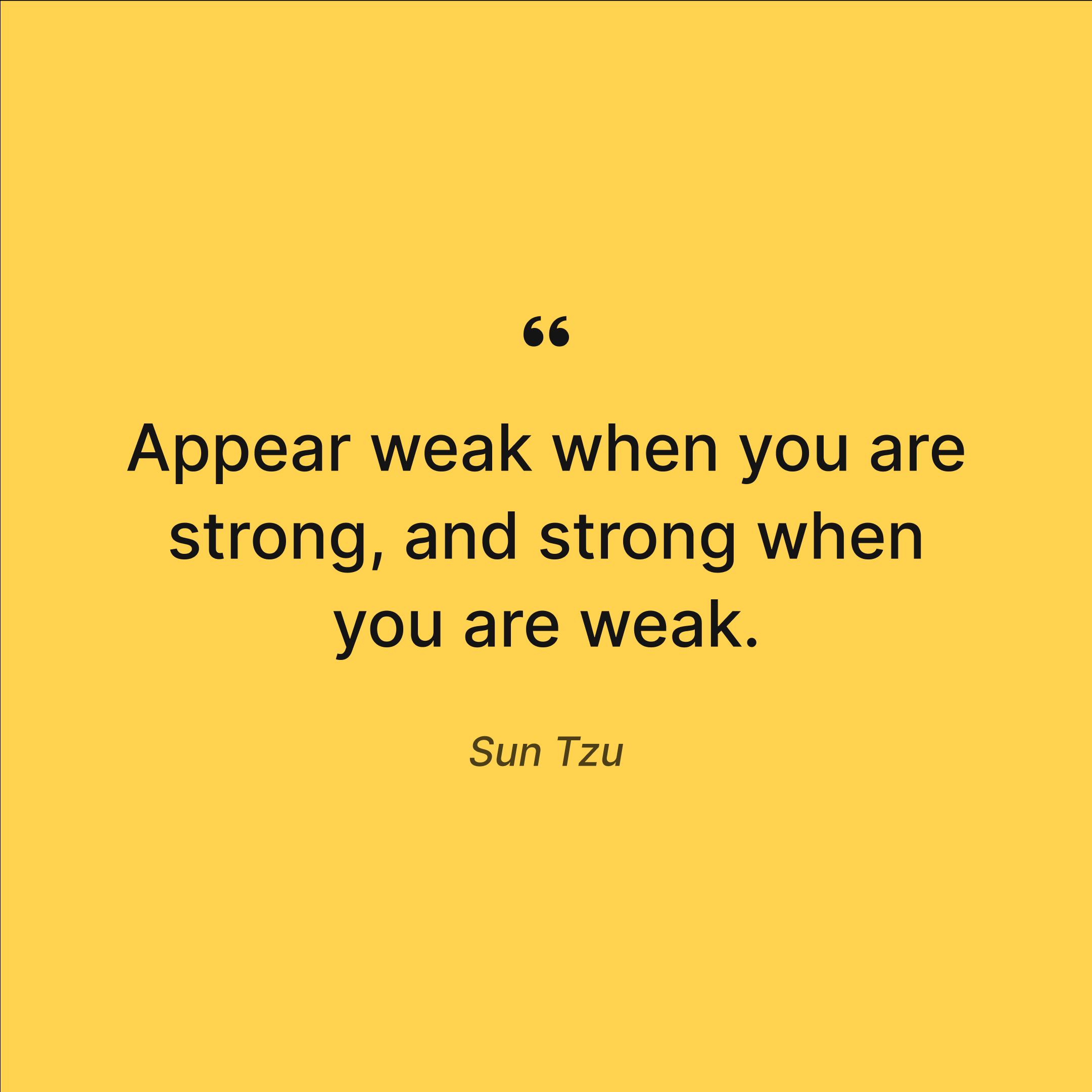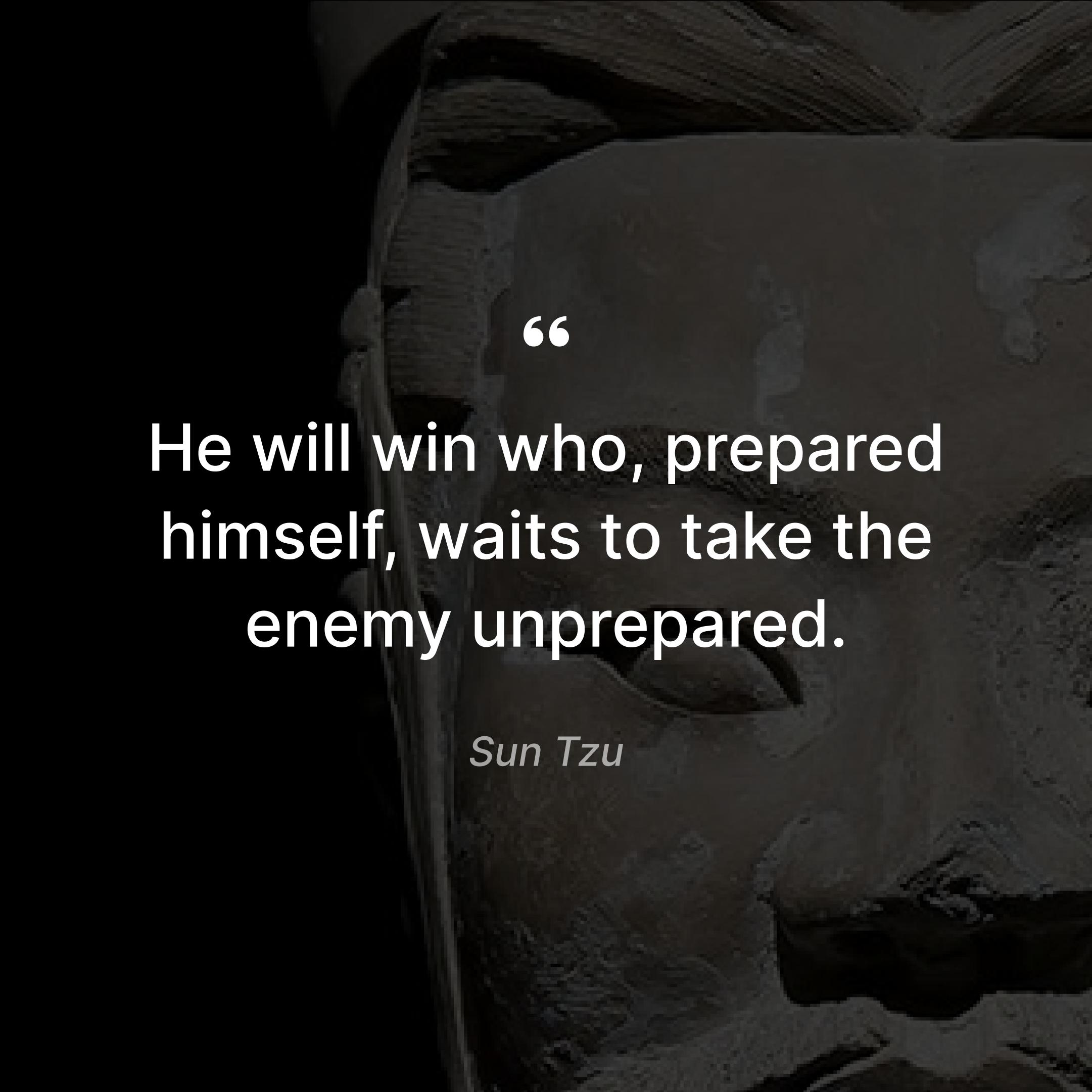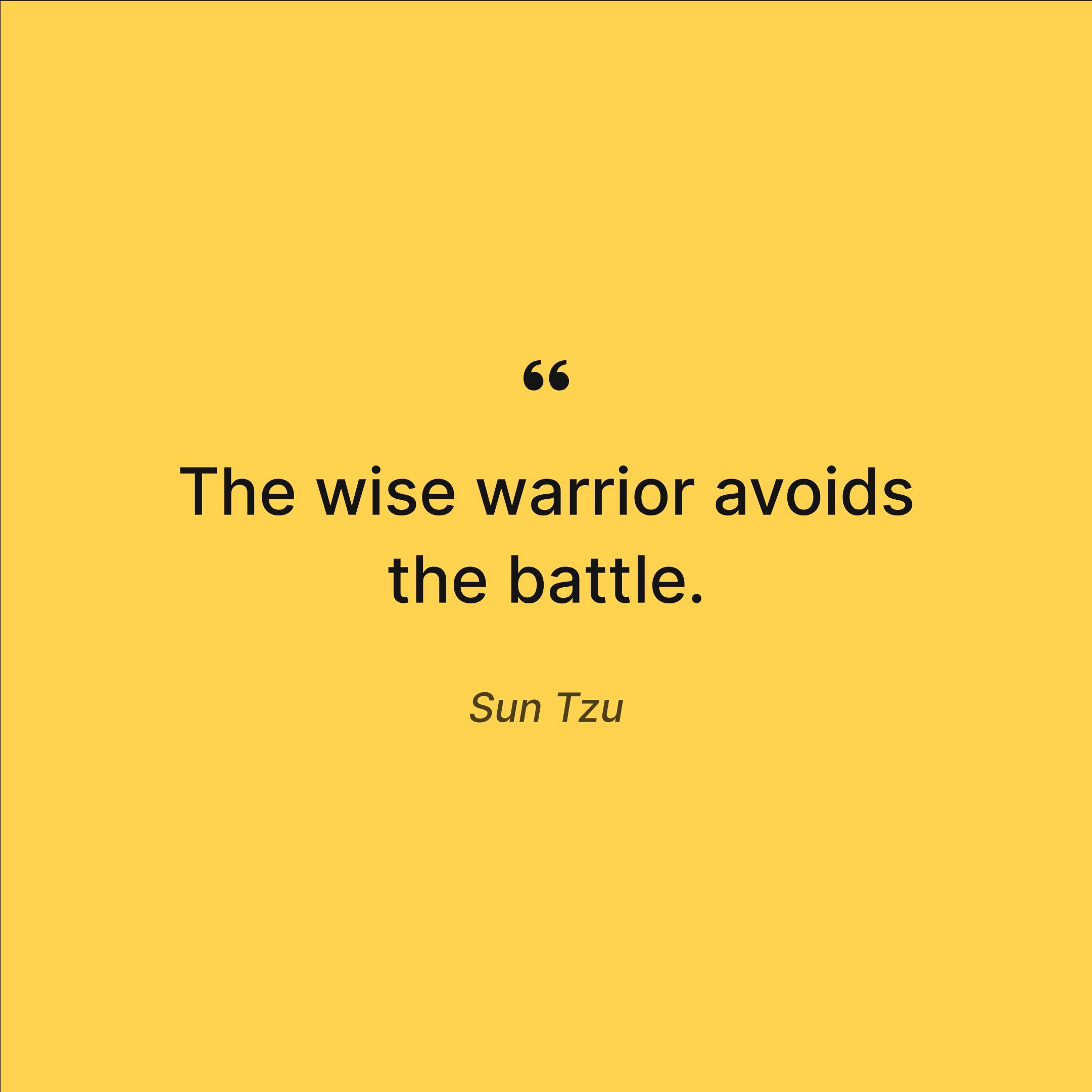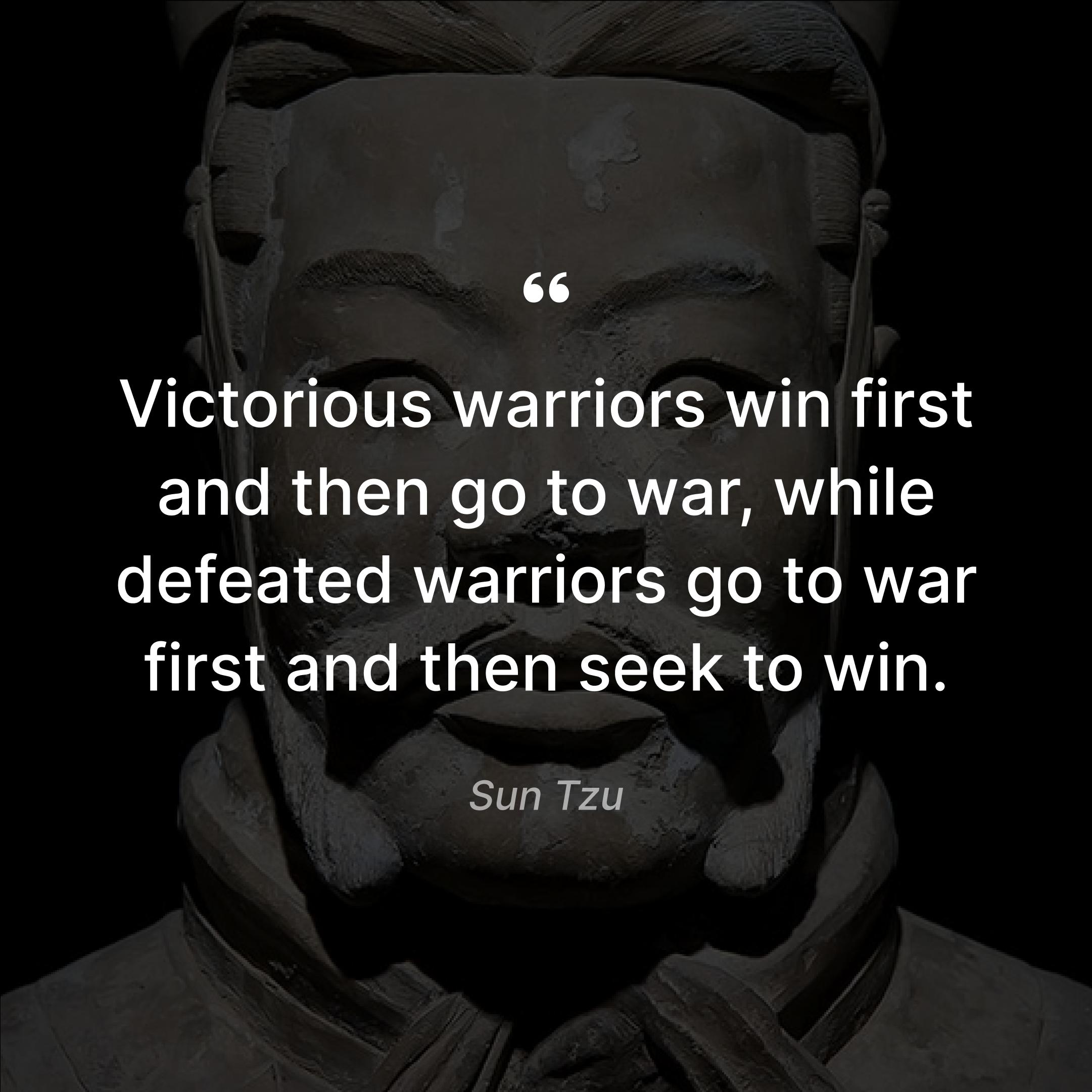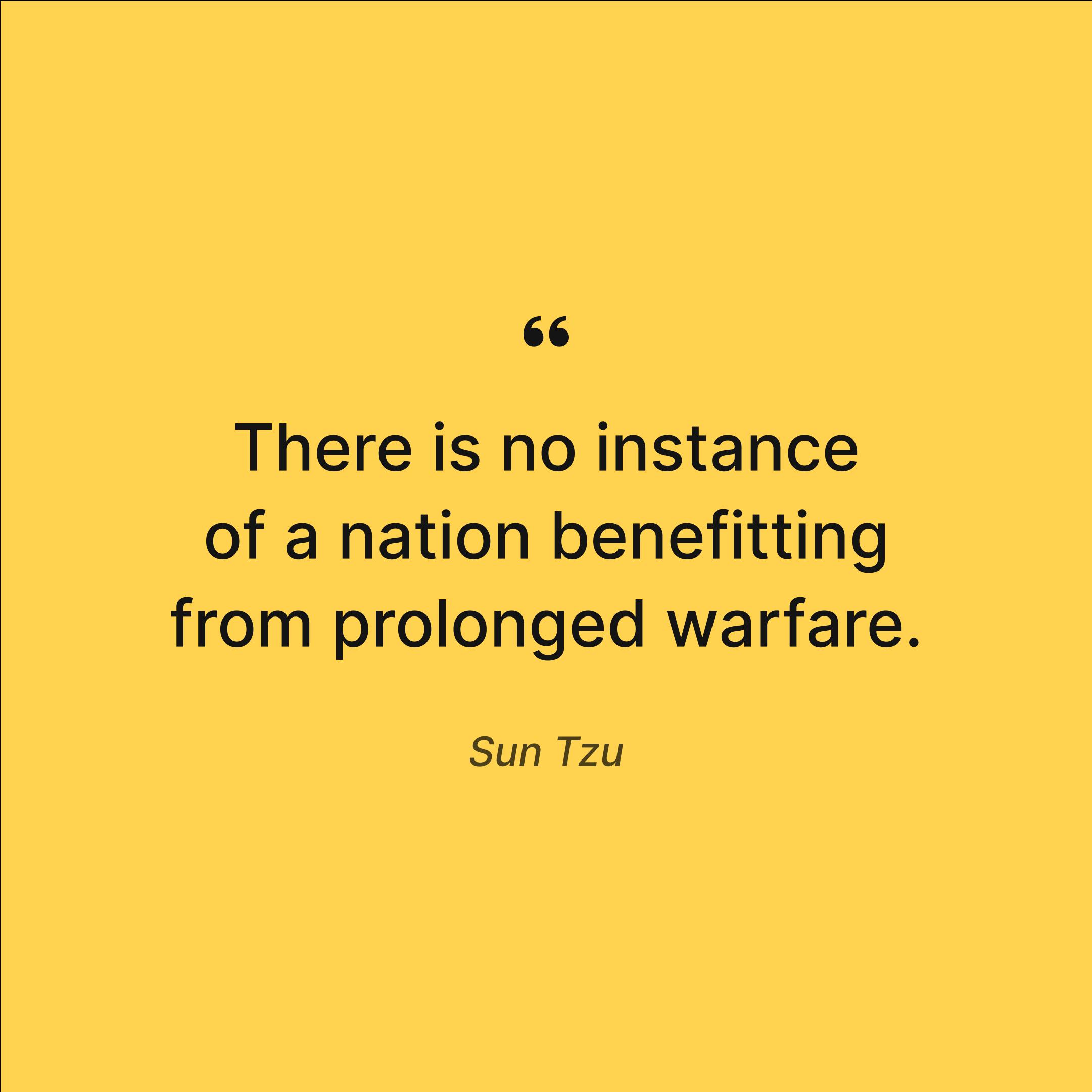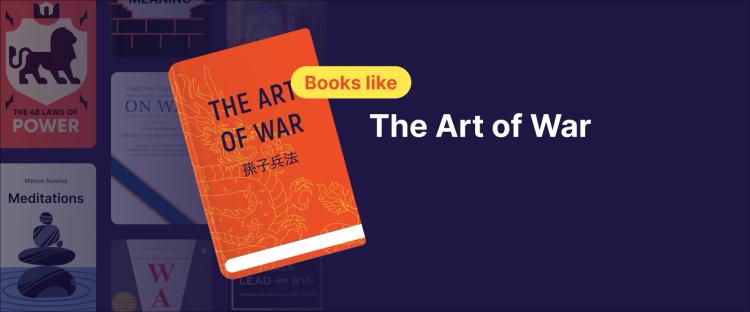Looking for powerful words to sharpen your leadership skills and inspire your team? Sun Tzu's 'The Art of War' quotes offer an endless source of ancient wisdom on strategic thinking and winning without fighting, using only your intelligence.
As a renowned Chinese general and military strategist from the 5th century B.C., Sun Tzu mastered the supreme art of war through trial and error. His experience and hands-on tips have inspired world leaders for centuries and continue to do so today. Here, you'll find the most famous quotes from 'The Art of War' organized by themes like strategy, command, and timing for easier and more in-depth comprehension.
Want more timeless insights? Get the gist of the wise general's military tactics with a short summary of 'The Art of War' in the Headway library. Hone your foreknowledge and know how to handle both superior and inferior forces in professional and personal settings. With concise, bulleted points from Sun Tzu's military treatise, self-learning will become more approachable and turn your reading habit into your greatest victory.
In this article, you'll learn:
Key leadership lessons from Sun Tzu’s 'The Art of War'
How to use strategy, timing, and deception effectively
The role of self-awareness and preparation in winning
Practical ways to lead with resilience and influence
Where to access quick summaries of Sun Tzu's wisdom
Top 10 'Art of War' quotes for leaders and decision-makers
What does it mean to be a good leader? Some thinkers assume that leadership is about power. Others believe that the greatest leader is wise, calm, and composed. For Sun Tzu, it's a mix of both. Here are the most memorable and on-point quotes from 'The Art of War' that every decision-maker should know to reveal their leadership potential.
1. "Treat your men as you would your own beloved sons. And they will follow you into the deepest valley."
When leaders genuinely care for their people, they earn a trust that goes deeper than authority. In fact, empathy and respect in whatever your role will inspire greater commitment than fear or control. Be a compassionate leader, and your people will go the extra mile for you.
2. "If you know the enemy and know yourself, you need not fear the result of a hundred battles."
Strategy starts with self-awareness and understanding your opposition. Before entering a negotiation or resolving a conflict, study both your strengths and your competitor's weaknesses. Knowing the full picture makes you harder to beat.
3. "There is no instance of a nation benefitting from prolonged warfare."
Prolonged warfare drains resources, morale, and clarity. And even a justified battle can become destructive if it drags on for too long. In business or life, don't let conflicts linger. The longer the fight, the greater the damage. Resolve issues early or know when to walk away to avoid damage.
4. "To win one hundred victories in one hundred battles is not the acme of skill. To subdue the enemy without fighting is the acme of skill."
Avoiding conflict altogether is the highest form of strategy. In the workplace, success often comes from diplomacy and timing, not confrontation. When you can resolve issues or outmaneuver competitors, you've truly mastered it.
5. "Appear weak when you are strong, and strong when you are weak."
Strategic deception can help you gain an edge. So, don't show all your cards at once. In competitive situations, understatement can create a surprise advantage, while bluster will only distract from your goal.
6. "He will win who, prepared himself, waits to take the enemy unprepared."
Timing is everything, especially when your opponent is least ready. It's your recipe for success and effective goal-setting. So, think long-term, stay ready, and strike when the moment is right.
7. "A good general knows when and how to change."
Sticking to one strategy out of pride or fear is a sure way to downfall. Instead, adapt to new information and technologies to welcome the change with open arms and a clear mind.
8. "Supreme excellence consists of breaking the enemy's resistance without fighting."
Real victory doesn't require an actual fight. You can gain an advantage by winning hearts and negotiating smartly. You'll avoid unnecessary workplace drama and personal conflict with clear communication.
9. "Victorious warriors win first and then go to war, while defeated warriors go to war first and then seek to win."
Rushing in without a strategy won't take you anywhere. So, before starting a project, campaign, or important conversation, make sure you're truly ready. Think through your goals first and then move forward, not the other way around.
10. "The wise warrior avoids the battle."
You'll break free from inner restraints and regain peace when you realize you can't win every fight. Sometimes, true wisdom is walking away and conserving your energy for what really matters.
Best Sun Tzu quotes on strategy, opportunity, and action
Absorb Sun Tzu's wisdom with his most impactful quotes on self-awareness, strategic thinking, conflict resolution, and proactive leadership. Whether you're a skilled leader or an aspiring manager, these lines will help you stay in line even in the most turbulent times.
Sun Tzu's strategy and deception tips: How to outsmart your opponents
"If you know Heaven and know Earth, you may make your victory complete."
"The quality of decision is like the well-timed swoop of a falcon which enables it to strike and destroy its victim."
"When you surround an army, leave an outlet free. Do not press a desperate foe too hard."
Win your battles before they even start with the summary of 'The Art of War' by Sun Tzu and 'The 48 Laws of Power' by Robert Greene on the Headway app.
Leadership and command lessons from 'The Art of War' for leading with integrity
"The enlightened ruler lays his plans well ahead; the good general cultivates his resources."
"A leader leads by example, not by force."
"Thus the expert in battle moves the enemy, and is not moved by him."
Want more ideas on decision-making, leadership under pressure, and discipline? Find key lessons in the summary of 'Leaders Eat Last' by Simon Sinek on the Headway app.
How self-awareness and preparation shape strong, strategic leadership
"Ponder and deliberate before you make a move."
"It is easy to love your friend, but sometimes the hardest lesson to learn is to love your enemy."
"Disorder came from order, fear came from courage, weakness came from strength."
Level up your inner mastery and self-reflection with the full summary of 'Thinking, Fast and Slow' by Daniel Kahneman and 'Atomic Habits' by James Clear on the Headway app.
Conflict, chaos, and opportunity: Sun Tzu's tactics
"In the midst of chaos, there is also opportunity."
"Anger may in time change to gladness; vexation may be succeeded by content."
"Bravery without forethought, causes a man to fight blindly and desperately like a mad bull."
Know how to adapt and grow in adversity with the main points from the summary of Jen Sincero’s 'You Are a Badass' on the Headway app.
Timing and action: When and how to make your move
"Great results can be achieved with small forces."
"Let your plans be dark and impenetrable as night, and when you move, fall like a thunderbolt."
"Plan for what it is difficult while it is easy, do what is great while it is small."
Foster patience and act at the right time with self-management tips from the summary of 'Master Your Emotions' by Thibaut Meurisse on the Headway app.
Five lesser-known 'The Art of War' quotes with big impact
Think you've seen all the best lines from 'The Art of War’? Think again! Enjoy your personalized collection of unique quotes that rarely make headlines but deliver powerful messages. Save them in your feed or print them out for easier and lasting access.
1. "Those who are skilled in combat do not become angered, those who are skilled at winning do not become afraid. Thus the wise win before they fight, while the ignorant fight to win."
When you can control your emotions, you wield true strength and think ahead clearly. It's the best thing you can do as a future leader and strategist. So, don't rush into decisions. Stay focused and resolve conflicts with a calm mind.
2. "Ground on which we can only be saved from destruction by fighting without delay, is desperate ground."
Hesitation is your worst enemy. And knowing your enemy is a key to success. Let your urgency be a powerful motivator to act boldly and make the right decisions. This way, there will be no room for hesitation and fear of failure.
3. "If, on the other hand, in the midst of difficulties we are always ready to seize an advantage, we may extricate ourselves from misfortune."
Seek opportunity everywhere, even in tough times. If you stay alert and flexible, you’ll be set to win. Whether you hit a personal low or made a mistake, use these pitfalls as learnings that push you to grow.
4. "There are not more than five musical notes, yet the combinations of these five give rise to more melodies than can ever be heard."
Running low on tools and resources? Use your creativity as fuel! Try focusing on blending your skills or assets in new ways. Great results often come from simplicity and smart execution, not abundance.
5. "The art of war teaches us to rely not on the likelihood of the enemy's not coming, but on our own readiness to receive him; not on the chance of his not attacking, but rather on the fact that we have made our position unassailable."
A true leader always hopes for the best but prepares for the worst. Instead of assuming your competitor won't launch first or that your client won't cancel, build systems that are resilient. Have a backup plan. Your power is in your preparation, not luck.
Strengthen your leadership strategy with Headway book summaries
Like many centuries ago, Sun Tzu's 'The Art of War' inspires today’s leaders with its practical advice on effective leadership and strategic planning. To keep all those lessons in one place, you can get a short summary of this and other strategy books in Headway's library. Read or listen to your favorite bestsellers on the go for the ultimate productivity boost!
Need more insights on related topics? Browse through other essential leadership guides like 'Good Strategy/Bad Strategy' by Richard Rumelt, 'All the President's Men' by Carl Bernstein and Bob Woodward, and 'The 5 Levels of Leadership' by John C. Maxwell. Their summarized format will help you grasp the key points faster and enjoy their practical value in everyday life.
Download the Headway app today and fight your inner slacker with a daily reading habit for self-fulfillment and personal growth.
Frequently Asked Questions
What are the best books for strategic thinking?
'The Art of War' by Sun Tzu and 'The Book of Five Rings' by Miyamoto Musashi are the best books on strategy and planning. Although written centuries ago, their insights are still relevant in today's business world. They prove that success comes not from brute strength but from careful preparation and understanding both yourself and your opponent.
What is the greatest quote in 'The Art of War?'
One of the most iconic and widely quoted lines from 'The Art of War' is:
"If you know the enemy and know yourself, you need not fear the result of a hundred battles."
This quote reflects the core of Sun Tzu'sstrategic thinking — true success comes not from force but from planning and self-awareness. Knowing your strengths, weaknesses, and the landscape around you gives you the clarity to act wisely and win with less resistance.
What are the five rules of 'The Art of War?'
Sun Tzu's 'The Art of War' rules include five core strategic principles:
Know yourself and your enemy. Self-awareness and understanding your opponent are the foundations of victory.
Win without fighting when possible. The best strategy is one that achieves results with minimal conflict.
Be prepared and plan ahead. Success is often secured before the action begins.
Adapt to change. Flexibility is key — don't cling to outdated plans in a new situation.
Use deception wisely. Appearances can be powerful. Misleading the enemy gives you the advantage.
These principles apply far beyond the battlefield. They're powerful tools for leadership, conflict resolution, and personal development.
How do generals win wars?
According to Sun Tzu, great generals win wars not through strength alone but through combining strategy, timing, preparation, and adaptability. In modern leadership, this translates to leading by example and making data-informed decisions instead of emotional ones.
What is the most effective way to win a war?
Sun Tzu stated that the most effective way to win is to avoid direct conflict when possible. In practical terms, this means anticipating problems and using persuasion to address the challenge before it escalates.
How to be a great general?
In Sun Tzu's eyes, a great general leads with wisdom, discipline, calmness, and flexibility. Encourage collaboration, remain adaptable, and lead by example, especially during uncertainty.

